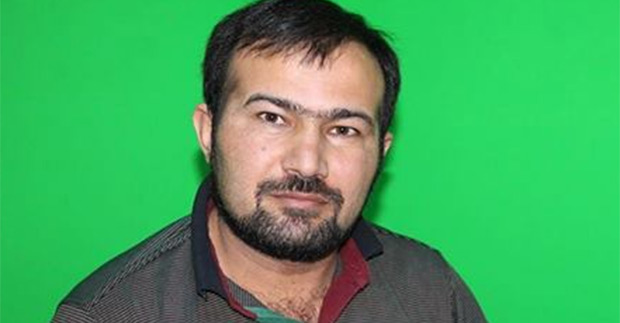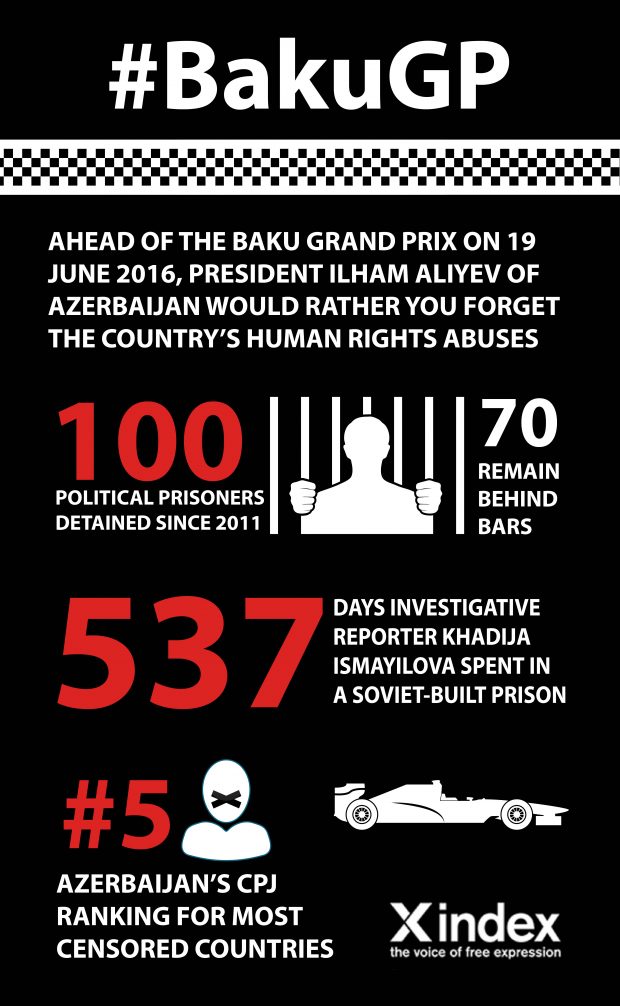Index relies entirely on the support of donors and readers to do its work.
Help us keep amplifying censored voices today.
18 August 2016. Less than six weeks ahead of a constitutional referendum, Azerbaijani authorities have unleashed a new wave of repression to silence critical voices. The undersigned members of the Sport for Rights coalition condemn this renewed crackdown, and call on officials to take immediate steps to improve the human rights situation in the country, starting with the release of political prisoners.
On 12 August, prominent Azerbaijani economist and executive secretary of the opposition Republican Alternative (REAL) movement Natig Jafarli was arrested on charges of illegal entrepreneurship and abuse of power, and sentenced to four months of pre-trial detention. On 17 August, the Court of Appeals rejected the appeal for his release. According to Sport for Rights member the Institute for Reporters’ Freedom and Safety, Jafarli has been locked up for his “peaceful criticism” of the country’s upcoming constitutional referendum. The charges against Jafarli stem from a criminal case the Prosecutor General’s Office launched against a group of NGOs in 2014. If convicted, Jafarli may face up to eight years of imprisonment.
|
Sport for Rights considers charges against activists to be politically motivated.
|
On 13 August, NIDA civic movement activist Elgiz Gahraman was arrested, held incommunicado over the weekend, charged on 15 August with drug possession, and sentenced to four months’ pre-trial detention. Also on 15 August, REAL movement youth activists Elshan Gasimov and Togrul Ismayilov were arrested and sentenced to seven days of administrative detention each on charges of resisting police. Authorities also harassed civic activist and former political prisoner Bakhtiyar Hajiyev, calling him in for questioning and then subjecting him to a court hearing that dragged out over three days, before fining him 100 AZN on charges of “minor hooliganism”.
Sport for Rights considers the charges against Jafarli, Gahraman, and the other activists to be politically motivated, and calls for their immediate and unconditional release, along with the release of all of Azerbaijan’s dozens of political prisoners – including opposition REAL movement leader Ilgar Mammadov, whose release has been ordered by the European Court of Human Rights; journalist Seymur Hezi; and youth activists Ilkin Rustemzade, Giyas Ibrahimov, and Bayram Mammadov.
This spate of repression takes place in the aftermath of Azerbaijan’s latest mega event, the Formula One European Grand Prix, held in Baku in June. It also takes place on the eve of a constitutional referendum set for 26 September, which will decide a series of problematic amendments aimed at further consolidating power in Azerbaijan’s already dominant presidency. The Azerbaijani government’s proposal of these amendments immediately followed July’s coup attempt in Turkey.
Events in Turkey have played a further role in Azerbaijan’s renewed crackdown. On 15 August, the Azerbaijani Prosecutor General’s Office announced it had opened a criminal case against supporters of the Turkish Gulen movement “to prevent illegal actions on the territory of Azerbaijan”. Detained NIDA civic movement activist Elgiz Gahraman was linked to the Gulen movement in an article in the pro-governmental press that also targeted figures of the opposition Popular Front Party and the satellite Azerbaycan Saatı (“Azerbaijan Hour”) programme, signalling possible further pressure to come. On 17 August, the Caucasus University in Baku announced it had fired 50 Turkish instructors for alleged links with the Gulen movement.
Broadcast of Azerbaijan Saatı was stopped on 27 July when Turkish television station Barış TV, which carried the programme, was among the media outlets shut down by a presidential decree in Turkey, alleging their connection to the Gulen movement. The transmission of another rare critical news source on developments in Azerbaijan, Radio Free Europe/Radio Liberty’s programme Azadlıq (“Freedom”) A-LIVE, was halted without explanation by Türksat satellite on 8 August. In Azerbaijan, private national television station ANS TV remains off the air following a court order on 29 July to revoke the station’s license in connection with an interview it had planned to broadcast with Fethullah Gulen.
All of this occurs against the backdrop of a dire overall human rights situation in Azerbaijan. The media remains completely dominated by the state, and critical journalists operate in a climate of fear. Excessive restrictions remain on civil society, severely hindering the ability of independent NGOs to operate. Travel bans continue to be used against journalists, activists, and politicians – including journalists Khadija Ismayilova, whose appeal to lift her travel ban was denied on 15 August, and Elchin Mammad, who was detained when trying to cross the Azerbaijani border on 9 August.
The Sport for Rights coalition calls for the Azerbaijani authorities to immediately cease these gross and systemic violations and take steps to improve the human rights situation in the country, starting with the immediate and unconditional release of political prisoners held for their peaceful political activities or exercise of their right to freedom of expression. Sport for Rights further calls for sustained attention to Azerbaijan by the international community, and concrete action to hold the Azerbaijani government accountable for its human rights obligations.
Supporting organisations:
ARTICLE 19
Canadian Journalists for Free Expression
Civil Rights Defenders
Freedom House
Freedom Now
Helsinki Foundation for Human Rights
Human Rights House Foundation
Index on Censorship
Institute for Reporters’ Freedom and Safety
International Media Support
International Partnership for Human Rights
Netherlands Helsinki Committee
Norwegian Helsinki Committee
PEN America
PEN International
People in Need
Reporters Without Borders
World Organisation Against Torture (OMCT)
Related:
Index on Censorship’s Azerbaijan campaign
Azerbaijan’s long assault on media freedom

Azadliq journalist Seymur Hezi was arrested in August 2014. He was subsequently convicted of aggravated hooliganism and sentenced to five years in prison.
Azerbaijan has never had a strong record on press freedom. Since independence, the country’s journalists have been mistreated, while independent and opposition newspapers faced constant libel charges and other harassment from local law enforcement or criminal elements.
Journalists and outlets that support government policies are left alone to fill their pages with praise, while those who take a more critical approach are punished. Official court documents detail how journalists have been sent to prison on trumped-up charges of hooliganism, extortion, trafficking, and instigating mass protests and violence.
In practice, however, targeted journalists reported on official corruption, criticised extravagant government spending or documented illegal evictions. While the country’s leaders and key decision makers pay lip service to media freedom, the government continues to hunt down journalists, activists and human rights defenders.
Periodic waves of arrests have created a sense of fear that has suffocated the country’s journalists. Independent media — like Index award-winning Azadliq — have been pushed into bankruptcy through the withholding of funds and spurious libel litigation. Even media organisations based outside the country — like meydan.tv — have been subject to harassment and punitive investigations. Azerbaijan’s small but remaining mass of independent voices is shrinking.
The timeline, beginning in 2003, includes journalists and bloggers who have been arrested and sentenced on bogus charges.
Under President Ilham Aliyev, the economy of Azerbaijan has expanded spectacularly. An oil boom has fueled a 10 fold increase in the size of its economy since he took power in 2003.
But under Aliyev, the country of 10 million has been one of the hardest and cruelest places in the world for journalists. According to Freedom House, Azerbaijan’s government has used spurious charges to jail journalists and human rights activists. Disseminating information that harms the “honor and dignity” of Aliyev is a criminal offense. Journalists’ telephone calls and internet activity are regularly surveilled.

“Having seen the development work in Baku as it’s neared completion over the past few months, it’s clear that the organisers have put a lot of planning and resources into the infrastructure around the circuit, and it promises to be a very significant event in the region.” So said Fernando Alonso, Formula One double World Champion and “Baku Ambassador” ahead of the European Grand Prix on the streets of the city on 19 June.
In his ambassador role, Alonso observed the progress being made on the streets of the Azerbaijani capital during an 8-9 March visit. What he almost certainly didn’t observe was the dire human rights situation in the country that has seen an assault on fundamental freedoms and attempts to silence critical voices.
The reason he wouldn’t have seen such abuses is because the Azerbaijani government has gone to great lengths to make the country appear as law-abiding and democratic in an attempt look legitimate and draw foreign money.
Azerbaijan has previously hosted other significant sports and cultural events — including the inaugural European Olympic Games in 2015 and the Eurovision Song Contest in 2012 — but as son of the country’s sports minister, Aria Rahimov, said, the upcoming Grand Prix is an opportunity “to promote our city from different points: from the touristic point of view, investment”.
There are many things President Ilham Aliyev’s autocratic regime, which has been in power since 2003, would rather we didn’t promote. Here are just three.
His government has:
1) Imprisoned journalists, activists and opposition politicians.
Over 100 political prisoners have been detained since 2011, when during the Arab Spring the country’s rulers feared an uprising at home. Around 70 of these prisoners remain behind bars.
Azerbaijani investigative journalist Khadija Ismayilova may have been released from prison last month, but two trumped-up charges against her — illegal entrepreneurship and tax evasion –remain. Her seven-and-a-half-year jail sentence has only been reduced to a three-and-a-half-year suspended term and she isn’t free to leave the country.
Many others, including journalist Seymur Hezi, are still serving prison sentences on charges that were widely condemned for being politically motivated to silence outspoken critics of the government of President Aliyev.
2) Led a crackdown on independent media outlets.
The Committee to Protect journalists lists Azerbaijan as the fifth most censored country in the world, ahead of Iran, China and Cuba. The ranking is in part due to the lack of independent media as “offices have been raided, advertisers threatened, and retaliatory charges such as drug possession levied against journalists”.
Azerbaijan’s independent media is under attack more than ever before. Most recently, editors of the Index award-winning opposition newspaper Azadliq received a letter from the Azerbaijan publishing house with a warning of discontinuation of the newspaper if it does not pay off its debts before 27 June. Azadliq — widely recognised as one of the last remaining independent news outlets operating inside the country — is convinced that the authorities are deliberately trying to put it out if business.
3) Allowed a climate of violence against critics to fester.
Torture and ill-treatment are widespread against political prisoners. Youth activists Bayram Mammadov and Giyas Ibrahimov were tortured in May 2016, allegedly to draw confessions for trumped-up drugs charges.
Public attacks against journalists are widespread and murder is not uncommon. In 2005, Elmar Huseynov, an independent Azerbaijani journalist, widely known for his harsh criticism of Azerbaijani authorities and president Aliyev, was murdered in outside his home in Baku. In 2011, Rafiq Tağı, who had written an article deemed to be critical of Islam and the Islamic prophet Mohammed was stabbed in a car park near his home, later dying in Baku hospital.